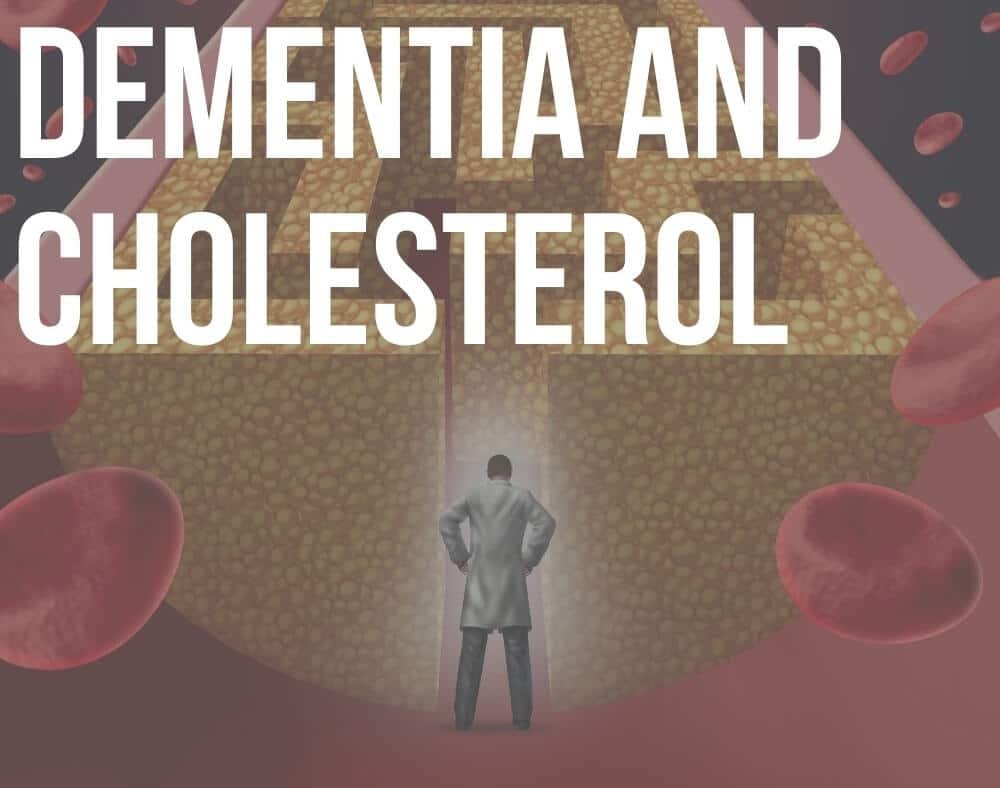Several studies report that there is a link between dementia and cholesterol levels in the human body.
Before getting deeper into this, it is important to note that cholesterol is essential for the healthy functioning of the body.
But there is a catch.
Is There a Link Between Dementia and Cholesterol?
Without this, people would not be able to produce hormones or digest food.
We can describe cholesterol as a waxy-like fatty substance that the liver produces.
It is also present in some foods. Cholesterol circulates through the blood-stream in carries known as lipoproteins made of proteins and fats.
Even though the fatty substance is beneficial, too much cholesterol in the blood can harm vascular and heart health.
There are two types of cholesterol

1. HDL (high-density lipoprotein) – also known as “good cholesterol” this is responsible for preventing the build-up of cholesterol in the arteries. Not just that, but it also protects a person against stroke and heart attack.
2. LDL (low-density lipoprotein) – referred to as “bad cholesterol” this is what causes high levels of cholesterol.
With this in mind, let’s jump into the relationship between dementia and cholesterol.
Health experts agree that watching cholesterol levels can help keep Alzheimer’s disease at bay which is one of the most common dementia types.
It can also help prevent the development of vascular dementia which is one of the most common types of dementia.
Below we will expound more on how lowering cholesterol may be instrumental in starving off dementia.
Studies on How High Levels of Cholesterol can Increase Dementia Risk

One of the factors that can increase a person’s risk of developing dementia is high cholesterol.
A neurology study borrowing insights from Niemann Pick-C disease and Down’s syndrome stated that high cholesterol disrupts the process of cell division.
Dr. Kensuke Sasaki one of the authors of this study said that his team of researchers discovered that high levels of cholesterol were related to brain plaques that are markers for Alzheimer’s disease.
Kensuke is a researcher at Kyushu University in Japan.
Together with his team of professionals, they tested cholesterol levels for about 2600 people aged 40-79.
At the beginning of the study, all the participants were dementia-free. The researchers then checked on the participants after 10-15 years.
They also conducted autopsies on the persons who had passed on. They found 34% of the individuals had been diagnosed with dementia.
Autopsies also revealed hallmark tangles and plaques of the illness which normally translated to protein build-up in the brain.
The study recorded that 86% of individuals with high levels of cholesterol had brain plaques.
Only 62% of the people with low cholesterol had plaques.
A similar study investigating the link between dementia and cholesterol was reported by researchers in Arteriosclerosis Thrombosis and Vascular Biology: Journal of the American Heart Association.
Low levels of HDL can contribute to a memory decline

In this study, professionals observed 3,673 participants from the Whitehall II study. 26.8% of the subjects were women.
The researchers discovered that low levels of HDL cholesterol were among the major predictors of declining memory by the time a person turns 60.
The experts came to the conclusion after measuring lipid concentrations in blood samples they collected after the participants underwent an eight-hour fast.
Researchers at Emory University and the Atlanta Veterans Affairs Medical Centre also conducted a study that found an association between early-onset Alzheimer’s disease (AD) and high LDL cholesterol levels.
This condition is considered “early-onset” when it develops before a person is 65 years.
To find out whether early-onset AD is related to cholesterol the experts sequenced various genomic regions of 2,125 participants.
Among them, 654 already had early-onset Alzheimer’s while 1,472 wee controls.
The researchers also went ahead to test blood samples from 267 subjects to determine their LDL cholesterol levels.
From the blood samples, the experts discovered that people with elevated LDL levels were more likely to develop early-onset AD when compared to persons with lower levels of cholesterol.
They published their findings in JAMA Neurology.
Contracting Studies on the Link between Risk of Dementia and Cholesterol Levels

While many studies state that high cholesterol levels can increase dementia risk, some scientists in the US dispute this.
They are on record stating that high cholesterol levels in seniors over 85 have been linked to reduced decline in thinking abilities and memory.
They published their findings in Alzheimer’s and Dementia a scientific journal.
Knowing that high levels of cholesterol were linked to cardiovascular diseases and higher dementia risk, the scientists opted to study people who are over the age of 85.
In their study, they found that the elderly who had already celebrated their 85th birthday has fewer problems with thinking and memory even though they also had higher levels of cholesterol.
Chief Scientific Officer of Alzheimer’s Research UK Dr. David Reynolds said that although most of the evidence points towards the dangers of high cholesterol levels it is not easy to pinpoint one dementia factor in the group of seniors who do not have the disease.
He continued to explain that high cholesterol levels in the participants of the study might have been linked to enhanced cognitive function because it was a reflection of the genetic makeup of individuals who live to an advanced age instead of the cholesterol levels in their blood.
There is still no evidence or suggestion from the research that people need to increase their levels of cholesterol levels to sustain a healthy brain.
Because of the results of this study, the impact of high cholesterol levels remains a controversial and intriguing subject.
Closing Remarks
Seeing that overwhelming evidence points to the association between dementia and cholesterol levels, everyone must get to know the levels of this waxy-like fatty substance in their blood.
The recommendation for adults over the age of 40 is to take a blood test once every 5 years which can help in identifying the risk.
Women who are above 50 years and men who are over 45 may need to take the tests more frequently.
For now, scientists will continue to explore the role that cholesterol has in dementia development.

